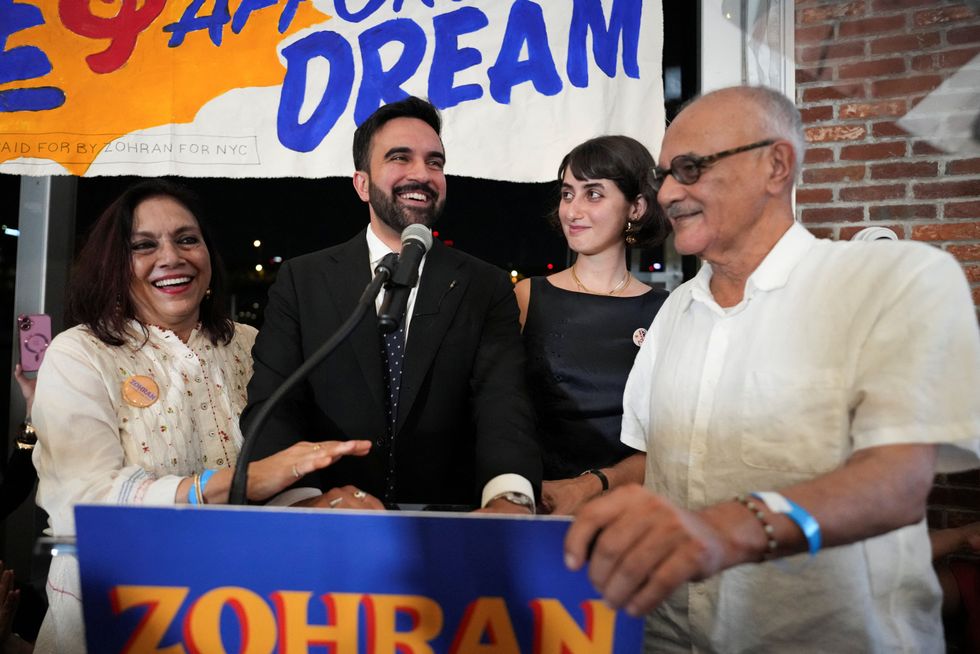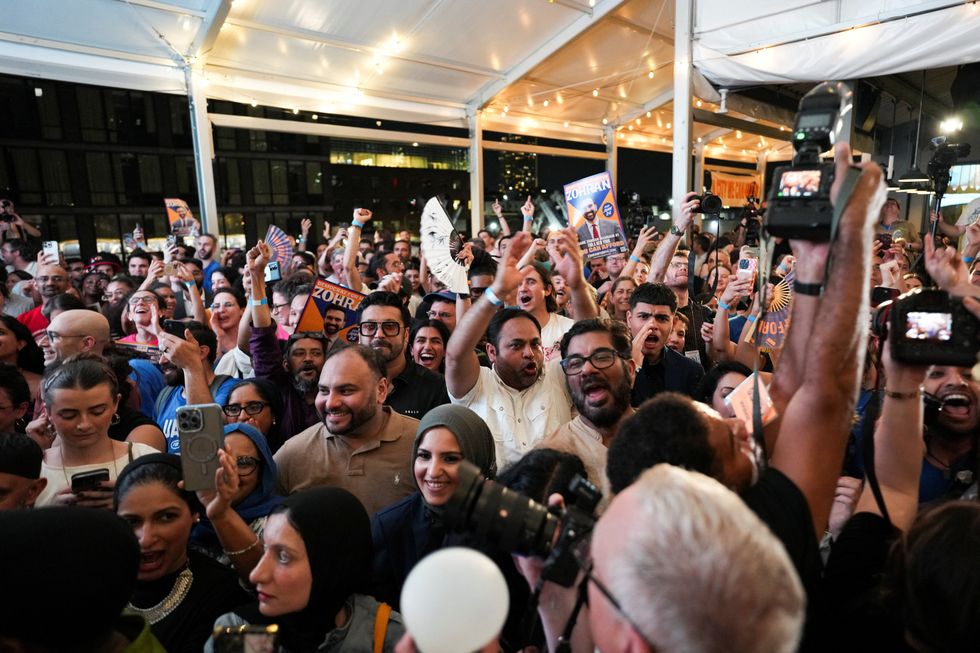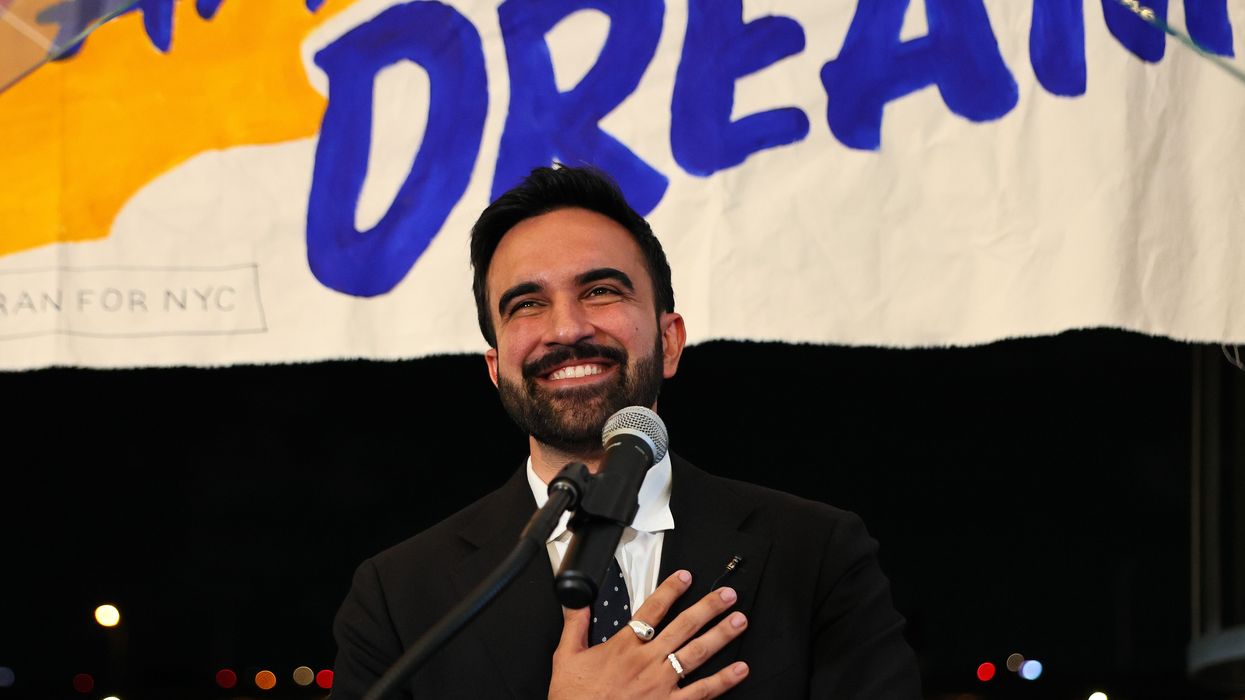INDIAN AMERICAN lawmaker Zohran Kwame Mamdani last week clinched the Democratic nomination for mayor of New York City, defeating former governor Andrew Cuomo in what is being described as one of the most unexpected results in recent city political history.
Mamdani, 33, a state assemblyman representing Queens and a self-declared democratic socialist, stands on the brink of becoming New York’s first Muslim and Indian American mayor.
His win was announced last Tuesday (24) , triggering widespread reactions and placing his progressive agenda in the national spotlight.
“In the words of Nelson Mandela: it always seems impossible until it’s done,” Mamdani wrote on social media after the result. “My friends, it is done. And you are the ones who did it.”
Born in Kampala, Uganda, on October 18, 1991, Mamdani moved to New York at seven with his parents, acclaimed Indian filmmaker Mira Nair and Ugandan academic Mahmood Mamdani, who is of Indian descent.
Mamdani’s social and political awareness was shaped by the cultural and intellectual legacy of his parents, and would later influence his entry into grassroots activism and state politics, reports said.
Mamdani is married to Syrian American artist Rama Duwaji and the couple live in Brooklyn.
His strategy combined grassroots mobilisation with radical ideas aimed at transforming the economic structure of New York City. His message, focused on affordability, public infrastructure and working-class empowerment, gained traction with a diverse base across boroughs.
“We have won from Harlem to Bay Ridge,” he declared at a crowded victory party in Queens. “This is your victory.”
Among his most eyecatching proposals are a citywide rent freeze for stabilised tenants, fare-free public buses, universal childcare from six weeks to five years, and the establishment of city-owned grocery stores to counter food inflation.
In a city where a three-bedroom apartment can easily cost $6,000 (£4375) a month, his message struck a chord.
Voter Eamon Harkin, 48, said prices were his “number one issue.”
“What’s at stake is primarily the affordability of New York,” he said.
A revenue plan outlined by Mamdani’s campaign would increase taxes on corporations to match New Jersey’s 11.5 per cent rate and introduce a two per cent flat tax on New Yorkers earning over $1 million (£790,000) annually. Additional revenue would be generated through procurement reform, enhanced tax audits and enforcement against corrupt landlords – potentially raising $6 billion (£4.74bn) in new funds.
“New York is too expensive,” reads a central line from his campaign website. “Zohran will lower costs and make life easier.” Mamdani’s legislative record backs up his activist credentials. He previously joined hunger strikes with taxi drivers to secure $450 million (£356m) in debt relief, helped secure more than $100m (£79m) for improved subway services, and piloted fare-free bus initiatives.
He defended his democratic socialism last Sunday (29) and argued that his focus on economic issues should serve as a model for the party, even though some top Democrats have been reluctant to embrace him.
In an interview with NBC’s Meet the Press, Mamdani said his agenda of raising taxes on the wealthiest New Yorkers and on corporations to pay for ambitious policies such as free buses, a $30 minimum hourly wage and a rent freeze was not only realistic, but tailored to meet the needs of the city’s working residents.
“It’s the wealthiest city in the wealthiest country in the history of the world, and yet one in four New Yorkers are living in poverty, and the rest are seemingly trapped in a state of anxiety,” he told NBC’s Kristen Welker.

Democrats have struggled to find a coherent message after their resounding loss in the November elections that saw president Donald Trump return to the White House and his Republicans win control of both chambers of Congress.
Mamdani’s campaign, which drew plaudits for its cheery tone and clever viral videos, could help energise young voters, a demographic that Democrats are desperate to reach in 2026 and beyond. His rise from a virtual unknown was fueled by a relentless focus on affordability, an issue Democrats struggled to address during last year’s presidential race.
“Cost of living is the issue of our time,” Neera Tanden, the chief executive of Democratic think tank Center for American Progress wrote on X in response to Mamdani’s win. “It’s the through line animating all politics. Smart political leaders respond to it.”
His history-making candidacy could also drive engagement among Asian and especially Muslim voters, some of whom soured on the Democrats after former president Joe Biden administration’s support for Israel’s war in Gaza.
“These elections aren’t about left, right or center, they’re about whether you’re a change to the status quo. People don’t want more of the same, they want someone who plays a different game,” said Democratic strategist Jesse Ferguson.
Few expected Mamdani, a relatively young assemblyman, to unseat former New York governor Andrew Cuomo, a veteran political heavyweight attempting a comeback.
Senator Bernie Sanders congratulated Mamdani publicly, calling the result a triumph over “the political, economic and media establishment.”
But not all reactions were celebratory. The city’s current mayor, Eric Adams, launched his independent re-election campaign, framing Mamdani’s ideas as unrealistic and irresponsible.
Adams did not name Mamdani during an event held on the steps of New York City Hall last Thursday (26), but he alluded to some of the self-described Democratic socialist’s positions and background.
“This election is a choice between a candidate with a blue collar and one with a silver spoon,” Adams said. “A choice between someone who delivered lower crime, the most jobs in history and the most houses built in decades and an assembly member who did not pass a bill.”
Adams won as a Democrat in his first mayoral bid in 2021, but saw his popularity plummet following his indictment on corruption charges and the subsequent decision by president Donald Trump’s Justice Department to drop the case.
In April, he announced that he would run for election as an independent, avoiding the Democratic primary that included Mamdani and Cuomo.
Mamdani’s victory in the primary and potential win in the general election has prompted strong reactions from progressives, who have cheered his campaign’s upbeat tone and focus on economic issues, as well as conservatives and some in the business community, who criticised his democratic socialist policies.
Polling now shows Mamdani ahead of Adams and Republican candidate Curtis Sliwa for the November general election, though former governor Cuomo is rumoured to be considering an independent run, which could split the Democratic vote. Political analysts predict his November challenge will be formidable.
Besides Adams, Sliwa, and Cuomo, independent candidates including lawyer Jim Walden will crowd the ballot.
But with registered Democrats outnumbering Republicans nearly three to one in the city, his base, if energised, could prove decisive.

Earlier last Sunday, Democratic House Minority leader Hakeem Jeffries, who represents part of the city, told ABC’s This Week that he wasn’t ready to endorse Mamdani yet, saying that he needed to hear more about Mamdani’s vision.
Other prominent New York Democrats, including New York governor Kathy Hochul and Senate Minority Leader Chuck Schumer, have also thus far declined to endorse Mamdani.
Trump, himself a native New Yorker, told Fox News Channel’s Sunday Morning Futures with Maria Bartiromo that if Mamdani wins the mayoral race, “he’d better do the right thing” or Trump would withhold federal funds from the city.
“He’s a communist. I think it’s very bad for New York,” Trump said.
Asked about Trump’s claim that he is a communist, Mamdani told NBC it was not true and accused the president of attempting to distract from the fact that “I’m fighting for the very working people that he ran a campaign to empower that he has since then betrayed.”
He also voiced no concern that Jeffries and other Democrats have not yet endorsed his candidacy.
“I think that people are catching up to this election,” he said. “What we’re showing is that by putting working people first, by returning to the roots of the Democratic Party, we actually have a path out of this moment where we’re facing authoritarianism in Washington, DC.”
Basil Smikle, a political analyst and professor at Columbia University’s School of Professional Studies, said heavy-handed attacks on Mamdani could backfire by energising “a lot of the Democratic voters to want to push more against Trump.”
“I don’t think it hurts Democrats in the long run,” he said. “I actually think it helps them.”
For his part, Mamdani seemed ready to embrace his role as a party leader, telling supporters in his victory speech that he would govern the city “as a model for the Democratic Party – a party where we fight for working people with no apology.” He vowed to use his mayoral power to “reject Donald Trump’s fascism.”
Democratic voters say they want a new generation of leaders and a party that concentrates on economic issues, according to a Reuters/Ipsos poll in June. The mayoral election is scheduled to take place on November 4.




